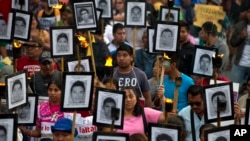U.N. human rights experts called on the government of Mexico on Wednesday to "cease the surveillance immediately" of activists and journalists and to conduct a fully impartial investigation into the illegal spying.
In the latest case, an international probe into the 2014 disappearance of 43 students in Mexico was targeted with spying software sold to governments to fight criminals and terrorists, according to a report published last week.
Civilians in Mexico have been targeted by the software known as Pegasus, which Israeli company NSO Group only sells to governments, according to the report by Citizen Lab, a group of researchers based at the University of Toronto's Munk School of Global Affairs.
"We urge the Government to commit to cease the surveillance immediately," the independent U.N. experts said in a joint statement demanding effective controls over the security and intelligence services.
"The allegations of surveillance, which represent a serious violation of the rights to privacy, freedom of opinion and expression, and freedom of association, are highly concerning and are evidence of the hostile and threatening environment that human rights defenders, social activists and journalists face in Mexico today," they said.
Mexican President Enrique Pena Nieto has asked the attorney general's office to investigate previous charges that the government spied on private citizens, saying he wanted to get to the bottom of the accusations that he called "false."
"We are concerned about the alleged implication in the purchase and use of Pegasus of the same authorities that are now in charge of conducting the investigations", the U.N. experts said. "In that sense, we call on the Government to take all the necessary steps to ensure the impartiality of the investigating organ."
Citizen Lab said it had found a trace of the Pegasus software in a phone belonging to a group of experts backed by the Inter-American Commission on Human Rights who investigated the 2014 disappearance of the students that marked one of Mexico's worst atrocities.
The U.N. experts include those on human rights defenders, enforced disappearances, freedom of opinion, and the right to privacy.





